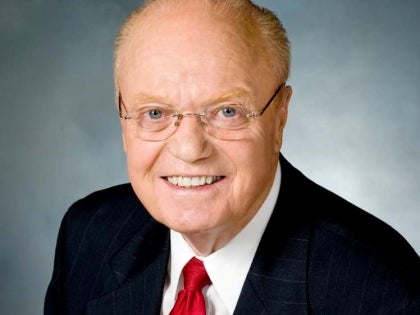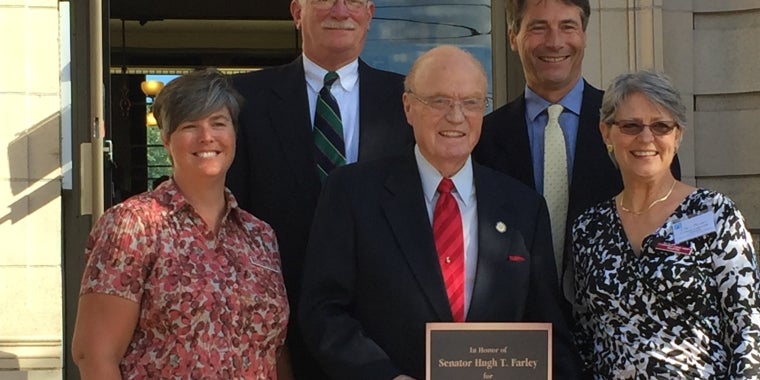
Senator Farley Notes Bicentennial of Elizabeth Cady Stanton's Birthday
Hugh T. Farley
May 7, 2015
I am pleased to report the New York State Senate has passed a resolution I sponsored which celebrates the bicentennial of the birth of Elizabeth Cady Stanton, one of the founders and leading voices of the women’s rights movements who hailed from Johnstown, Fulton County. While her actual birthday isn’t until November 12th, celebrations and events honoring her have already been held across the State and more are slated throughout the year. A list of currently scheduled events can be viewed at http://www.elizabethcadystantonhometown.org/ECSProgramOfEvents.15.pdf
For more information on Elizabeth Cady Stanton, particularly her life in Johnstown, visit http://www.elizabethcadystantonhometown.org/ or http://www.ecswc.org/
I created a brochure on Elizabeth Cady Stanton back in 2006 when I co-sponsored the legislation designating November 12th to be Elizabeth Cady Stanton Day. I am updating it but it is still available at http://www.nysenate.gov/files/pdfs/Elizabeth%20Cady%20Stanton_2.pdf
The resolution reads:
WHEREAS, November 12. 2015, marks the Bicentennial of the birth of Elizabeth Cady Stanton, one of the founders and leading voices of the women’s rights movement; and
WHEREAS, Elizabeth Cady Stanton was born on November 12, 1815 in Johnstown, New York, to Daniel Cady and Margaret Livingston Cady; her father was a prominent attorney who also served as a State Legislator, Congressman and Judge; and
WHEREAS, She was educated at the Johnstown Academy and at the Troy Female Seminary, which had been established by Emma Willard; and
WHEREAS, In 1840, she married Henry Stanton, a reformer and abolitionist, and together they had seven children; and
WHEREAS, Through her personal experiences, and through observation of her father’s law practice, she became aware of the inequities and injustices faced by women, leading to her lifelong efforts for women’s rights; and
WHEREAS, She circulated petitions and advocated in New York State for passage of the Married Woman’s Property Bill, which was signed into law in 1848; and
WHEREAS, Her family moved to Seneca Falls, New York, in 1847; working with four other women, including Lucretia Mott, Elizabeth Cady Stanton organized the first Women’s Rights Convention, which was held in Seneca Falls in July 1848; she is credited with being one of the primary authors of the Convention’s Declaration of Sentiments, which was modeled after the Declaration of Independence, and is considered to be a founding document of the woman’s suffrage movement; and
WHEREAS, In 1851, Elizabeth Cady Stanton met Susan B. Anthony, which began a long friendship and partnership in the fight for women’s equality; and
WHEREAS, Elizabeth Cady Stanton participated in the abolition movement and the temperance movement, but was most active in, and best known for, her efforts on behalf of a wide range of women’s rights, especially the right to vote; and
WHEREAS, Although she died on October 25, 1902, Elizabeth Cady Stanton’s lifelong efforts laid the groundwork for the ratification in 1920 of the Nineteenth Amendment to the U.S. Constitution, which gave women the right to vote; and
WHEREAS, Several historical markers have been erected in her hometown of Johnstown to honor her efforts and legacy; local residents have also established the Elizabeth Cady Stanton Women’s Consortium in 2008, and the Elizabeth Cady Stanton Hometown Association in 2008; and
WHEREAS, The City of Johnstown and the County of Fulton are very proud of the accomplishments and legacy of Elizabeth Cady Stanton, and several local organizations are holding special events in 2015 in honor of the 200th Anniversary of her birth; and
WHEREAS, This Bicentennial is also being observed and celebrated by the National Park Service, which operates the Women’s Rights National Historical Park in Seneca Falls, and provides tours of the house in which she lived from 1847 to 1862; and
WHEREAS, In 1973, she was part of the first group of women inducted into the National Women’s Hall of Fame; her biographical entry notes that she is “Widely credited as one of the founding geniuses of the women’s rights movement”; and
WHEREAS, In recognition of her contributions and achievements, the New York State Legislature passed a law in 2006 which designated November 12th to be Elizabeth Cady Stanton Day; now, therefore, be it
RESOLVED, That this Legislative Body pause in its deliberations to commemorate the 200th Anniversary of the birth of Elizabeth Cady Stanton of Johnstown, New York, and to acknowledge and celebrate her dedication and accomplishments in the cause of women’s rights.
Share this Article or Press Release
Newsroom
Go to NewsroomOctober is National Domestic Violence Awareness Month
October 5, 2016

October Is Breast Cancer Awareness Month
October 4, 2016

September is National Preparedness Month
September 23, 2016

Senator Farley Secures Grant for Gloversville Library
September 15, 2016
